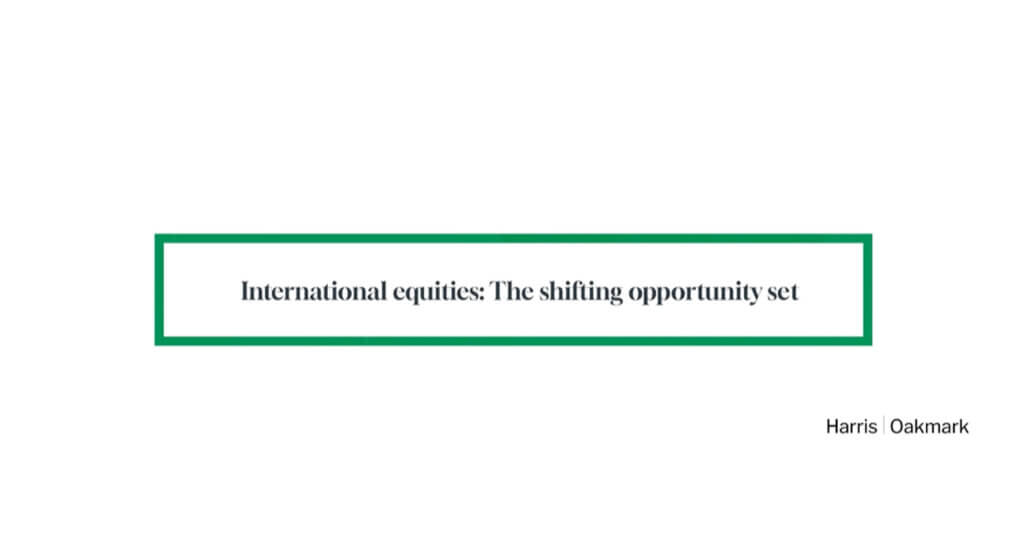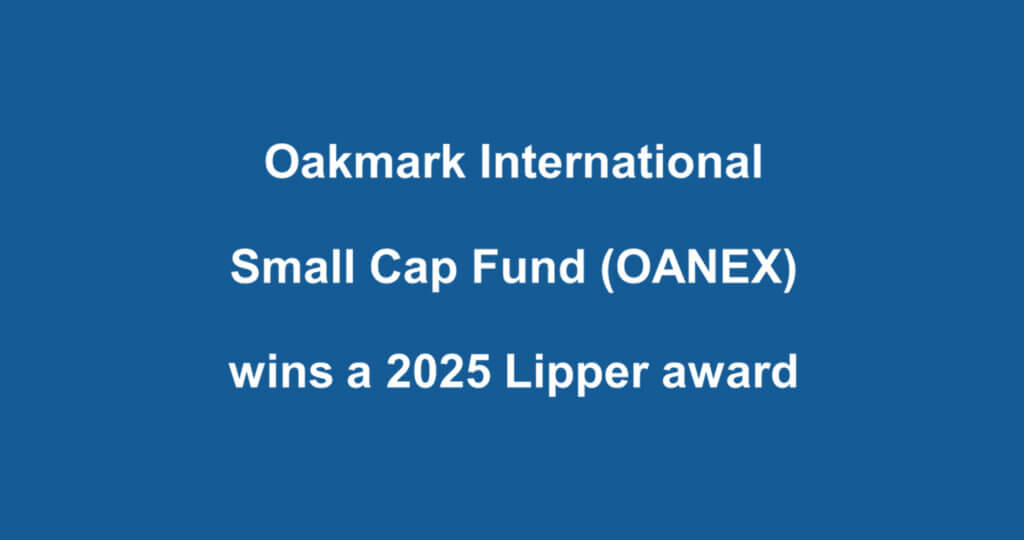Oakmark International Fund
Average Annual Total Returns 12/31/12
Since Inception 09/30/92 10.37%
10-year 11.23%
5-year 3.52%
1-year 29.22%
3-month 13.82%
Expense Ratio as of 09/30/12 was 1.06%
Oakmark International Small Cap Fund
Average Annual Total Returns 12/31/12
Since Inception 11/01/95 9.95%
10-year 12.41%
5-year 1.80%
1-year 18.39%
3-month 8.69%
Expense Ratio as of 09/30/12 was 1.41%
Past performance is no guarantee of future results. The performance data quoted represents past performance. Current performance may be lower or higher than the performance data quoted. The investment return and principal value vary so that an investor’s shares when redeemed may be worth more or less than the original cost. The performance of the Funds does not reflect the 2% redemption fee imposed on shares redeemed within 90 days of purchase. To obtain the most recent month-end performance data, view it here.
Fellow Shareholders,
I am pleased to report that both the Oakmark International Fund and the Oakmark International Small Cap Fund performed extremely well on an absolute and relative basis for the fourth calendar quarter of 2012. The Oakmark International Fund, in particular, not only experienced a standout quarter, earning 14%, it also enjoyed an exceptional year; returning just over 29%. Even more satisfying are the long-term returns of both Funds, with the Oakmark International Fund averaging just over 10% and the Oakmark International Small Cap Fund achieving an annualized return of just under 10% since their respective inceptions.
Winning by Staying Disciplined
If we revisit 2012, recalled is a year of macroeconomic and political turmoil. Due to conditions in Greece and Europe, results of the U.S. election and “fiscal cliff,” and a slowdown in emerging markets, investors were told by some pundits to be happy with a zero rate of return in “safe” government bonds. In fact, so much money flocked to and, to some degree, remains in this area of perceived safety, that real rates of returns in many of the world’s perceived “safe countries” are actually negative for government debt with less than a 10-year maturity. Moreover, there was a period of time this past summer when these countries had negative nominal rates for two-year maturities. Moreover, there was a period of time this past summer when the three mentioned European countries had negative nominal interest rates for two-year maturities.
Only one year ago, some experts predicted the disintegration of Europe with a strong possibility of sovereign defaults in Spain, Italy and Portugal. At the peak of the European Union’s crisis, Greece’s 10-year government bond yielded close to 30% and Italy’s approached 7%. Today, the EU is still together, Greece’s 10-year bond yields 11.25% and Italy’s yields 4.3%! Perhaps Italy isn’t going broke after all? And maybe Europe will eventually make it through its crisis?
Based on the past year’s events, we believe the lesson to be learned is that, once again, “macro shocks” tend to provide opportunity for long-term investors. During the worst of the situation, I had mentioned that, despite the nasty macro headlines, the global economy was still growing at a rate greater than 3.5%. When you combine this growth rate with extremely low equity market valuations, exploitable opportunity arises. The source of the opportunity is conceptually (and mathematically) simple: Market fear drives down share prices at a rate that is not at all consistent with changes in long-term business value. And, given that true investors have a VERY different time horizon than traders or speculators, we believe “true” investors can benefit if they stay disciplined.
The Future
Looking back, it was a grave year in terms of headlines. Nonetheless, it was a year in which yields of sovereign bonds that were deemed “risky” plummeted and share prices spiked. In fact, a U.S. dollar-based investor buying the Euro Stoxx 50 Index would have earned over 20% in 2012. This hopefully serves as a reminder that, for investors, what really matters is the price paid for a long-term stream of a company’s cash flow, not what the headlines say.
Here’s to a contented 2013 for our investor base! We remain committed to working hard to provide you with acceptable performance and are confident that we have a philosophy and process that will lead to continued investment success.
Past performance is no guarantee of future results. The performance data quoted represents past performance. Current performance may be lower or higher than the performance data quoted. The investment return and principal value vary so that an investor’s shares when redeemed may be worth more or less than the original cost. The performance of the Oakmark International Small Cap Fund does not reflect the 2% redemption fee imposed on shares redeemed within 90 days of purchase. To obtain the most recent month-end performance data, view it here.
Investing in foreign securities presents risks that in some ways may be greater than U.S. investments. Those risks include: currency fluctuation; different regulation, accounting standards, trading practices and levels of available information; generally higher transaction costs; and political risks.
The stocks of smaller companies often involve more risk than the stocks of larger companies. Stocks of small companies tend to be more volatile and have a smaller public market than stocks of larger companies. Small companies may have a shorter history of operations than larger companies, may not have as great an ability to raise additional capital and may have a less diversified product line, making them more susceptible to market pressure.
The discussion of the Funds’ investments and investment strategy (including current investment themes, the portfolio managers’ research and investment process, and portfolio characteristics) represents the Funds’ investments and the views of the portfolio managers and Harris Associates L.P., the Funds’ investment adviser, at the time of this letter, and are subject to change without notice.






